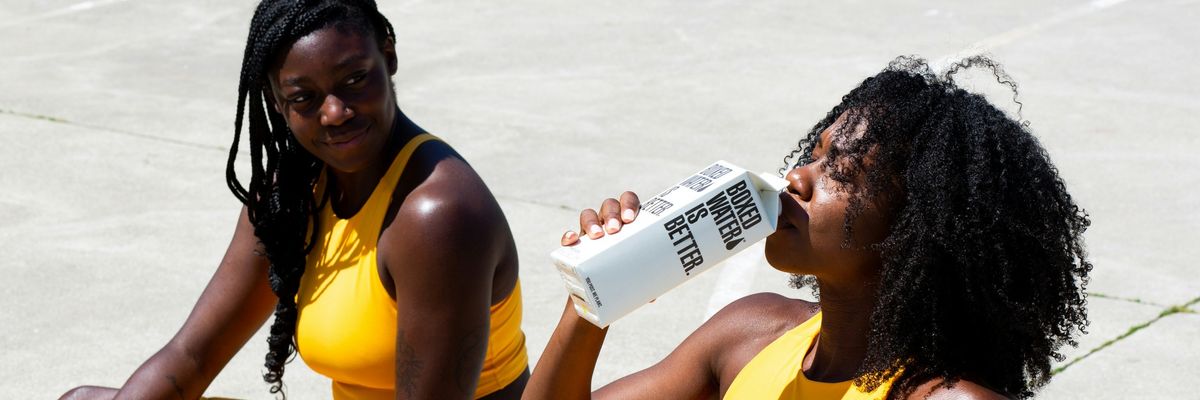HRDCVR's Danyel Smith Is Changing The Soul Of Journalism & How We View #RelationshipGoals
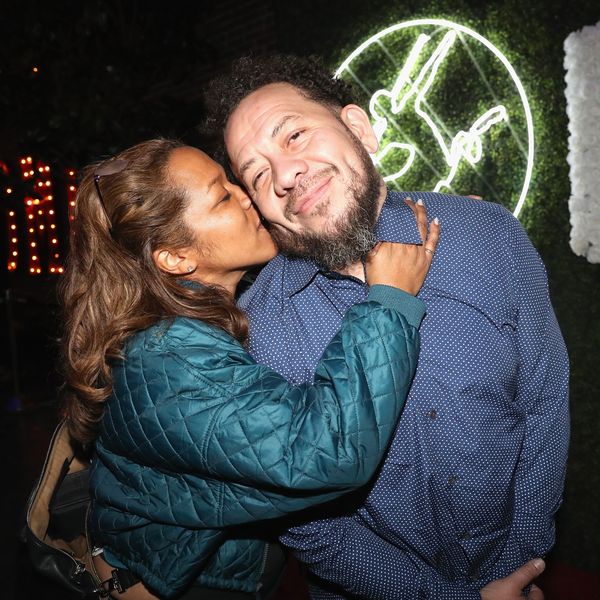
On October 6, the Sabrosa nightclub was packed. Guests filtered in off the streets of Manhattan's Meatpacking District into the white-washed brick building that during daytime hours would easily be glanced over.
They arrived in singles, pairs, groups—a mix of young and old of all races click-clacking down the concrete corridor illuminated in sensual dark-pink lighting and into an open room where DJ Austin Millz spun Drake and Future to a crowd wavy off of free Hennessey. At 9 'o clock glasses filled with Moet raised simultaneously in the air in celebration of the release of HRDCVR—a book-shaped magazine created to push the envelope of journalism, one that's free of the constraints of the web and not confined by the traditions. For us, by us, and catering to everyone.
For co-founder Danyel Smith, it was the icing on a cake, layered with 11 months of trials, triumphs, tears, and tenacity—a culmination of the vision that she and her husband, veteran journalist, and Rap Radar founder Elliott Wilson, dreamt up months ago.
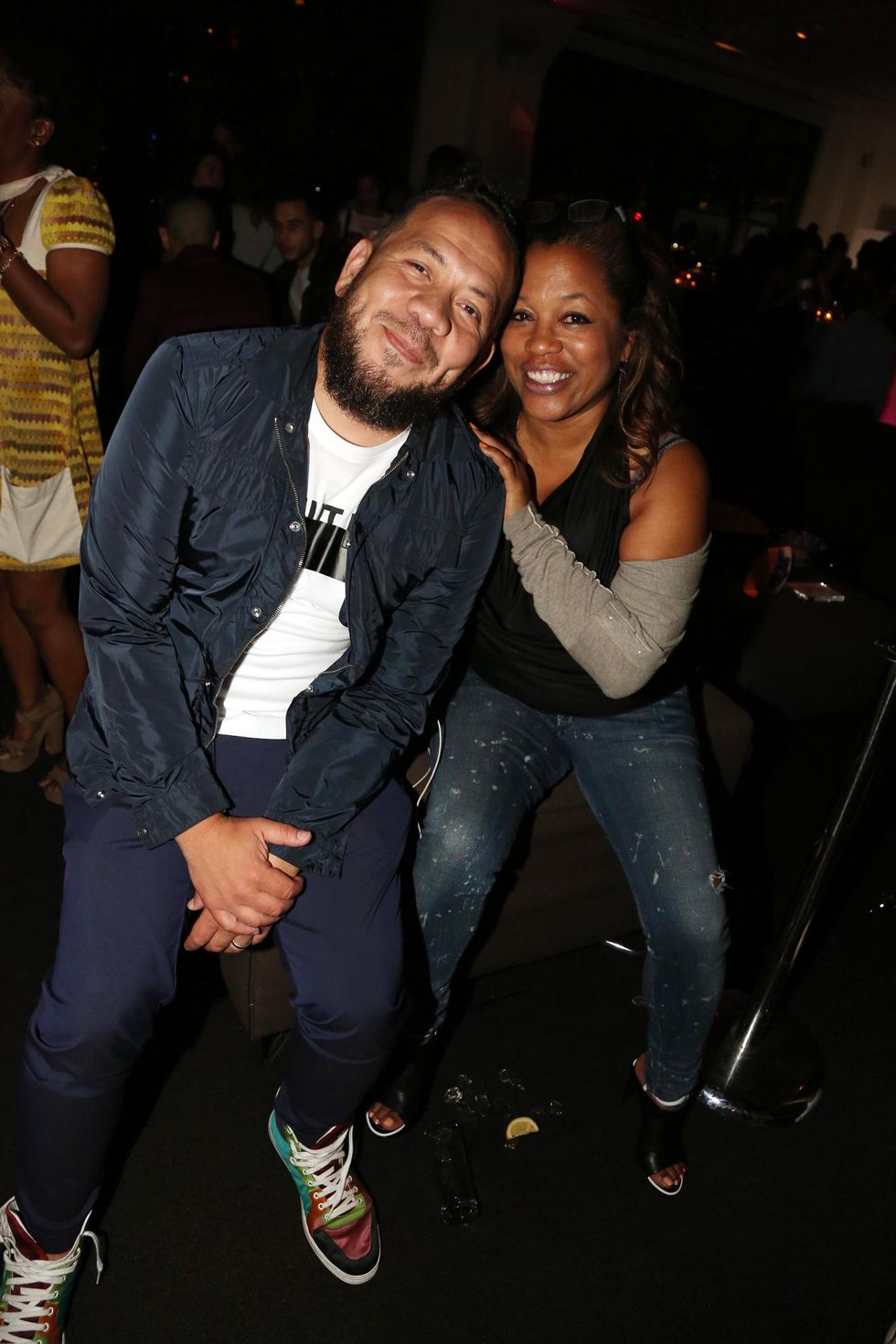
“Everybody was excited about the book and it was really a good time; it was a long time coming actually," Smith tells me on our call. “I feel like there's sometimes this kind of segregation between millennials and those older than them, and this wasn't that. It really felt like we included everyone."
Danyel is one of those journalists that you admire from a distance and study up close. She's talented, yes, hints why she's earned top positions at Vibe Magazine (Editor-In-Chief), Billboard (R&B Editor), Time Inc. (Editor-at-Large), and The Root (Executive Editor), and written for many more respectable publications on top of writing her novels More Like Wrestling and Bliss. But it's more than just her ability to pen profiles, it's her passion, respect for her craft, and thirst for knowledge of not just music, but the world around her, that has garnered her over 30,000 and 100,000 followers on Twitter and Tumblr respectively, as well as a number of devoted fans inspired by her work.
Not bad for someone who dropped out of college her sophomore year for family reasons, and didn't get her bachelor's degree until she was in her 30s.
“It's not easy no matter how talented, smart, or focused you are. You know, life happens to people, to women in particular, whether it's boyfriends, your neighborhood, family dramas, whatever it is."
"I always tell people, just because you take a turn to the left or a turn to the right, you can get back on your path at any time."
The East Oakland native who claims 83rd and East 14th Street has come a long way from interning at the San Francisco Bay Guardian, where she turned lackluster news on the history of olive oil into her own column, telling captivating stories of the rise of the hip-hop and R&B era when Cali artists Too $hort, Tupac, and Tony! Toni! Toné! were just hitting the scene. Building her name as a music critic unknowingly elevated her to the position of a pioneer—for there were very few women at that time covering the music industry, and even fewer diving into hip-hop.
But Danyel has never been afraid of pushing the envelope and ushering a new wave of traditions. In fourth grade, it was her newspaper, The Weekly Arrow, where her byline reigned supreme with news of the latest happenings from her then High Point Street Los Angeles neighborhood—circulation of six. Now, it's HRDCVR, a magazine printed as a book for the “new everyone" that doesn't just serve one group, as often seen with both mainstream and affinity magazines, but all people regardless of race, religion, lifestyle, or beliefs. The “underserved" as she calls them. It's very much reflective of the society that we live in—where traditional lines have been blurred and barriers broken.
The couple worked hard to build a team just as diverse as the content, bringing in writers from all backgrounds—some by profession and some by passion—as well as people that they knew and respected from previous jobs and projects. They gave $1,000 media fellowships to journalists and a designer to be a part of the team who would push all aspects of reporting, storytelling, and design—and brought on interns who understood the vision and were eager to play a role in bringing it to fruition.
But of course, creating something of this grandeur would take money. A lot of it. And what better way to know who's interested and supports your mission than by starting a crowdfunding campaign?
So they took to Kickstarter with an introduction video, promising a high-quality product with amazing visuals and diverse content. Every Monday they released the HRDlist, an email newsletter with catchy titles that curated diverse news headlines from around the world. They went heavy on social media, promoting daily and doing interviews talking about the “new everyone." In four days they received 50% of the funding. They pledged a goal of $30,000, and in 28 days they got $67,230 from 516 backers.
“We used [crowdfunding] because we wanted to have kind of an intimacy about who we were serving and a group of people that we could communicate with all the time, either on Twitter or via Kickstarter."
It was tough, though, and not just because they were managing a team that was spread out across the country (although they did use their temporary DUMBO office for central headquarters), but because Danyel also had to manage herself by stepping outside of her comfort zone.
“I had to re-learn to be as determined as I know how to be. I've been spending a lot of time as a student and working on my book, and I can be very introverted with those activities. But putting together a project like this, it's all about being outgoing and showing your personality. So, that's what I had to do and that's what the team had to do and I think that we all learned a lot of lessons from each other."
It was also the first time the couple would work on a project together instead of competing against one another in the journalism world. Elliott often recounts the story of when he was an editor at XXL while Danyel was the editor-in-chief of Vibe Magazine, and her snatching up the cover stories that he was actively pursuing.
“We both have very strong personalities and we both have an idea of how we would like things to be. And, while we've somewhat figured out how to deal with those strong personalities in marriage and relationships, on the creative partnership side of our bond, we are learning every day, and it's challenging. But look at the good work that came out of it."
It's the challenges that have allowed them to learn more about one another. I reference a Will and Jada Pinkett Smith interview where Jada talks about the couple creating Karate Kid together, and the challenge of how her and Will have different ways of creating, but how much she's learned from working with him and seeing things from a different perspective.
“I definitely did." She says when I ask her if she learned something from her and Elliott's time working on HRDCVR. “I forgot that Elliott is a copy editor. I forget that there's not a mistake that he doesn't see. He sees a mistake like there's an extra space between the period and the beginning of the next sentence. I be like, what?! He's very detailed in his head like that. And then there's some things he's not, there's some things, like, if we're looking at film, my notes back to people are intense and deep and Elliott is just like it's a lot you're saying, and I'm like because it's a lot that need to be done. So, it just depends. But you go back and forth between being big-picture and detail-oriented, and we learn a lot from each other.
[Tweet ""It comforts me that there's still new stuff to learn about him after 10 years of marriage.""]
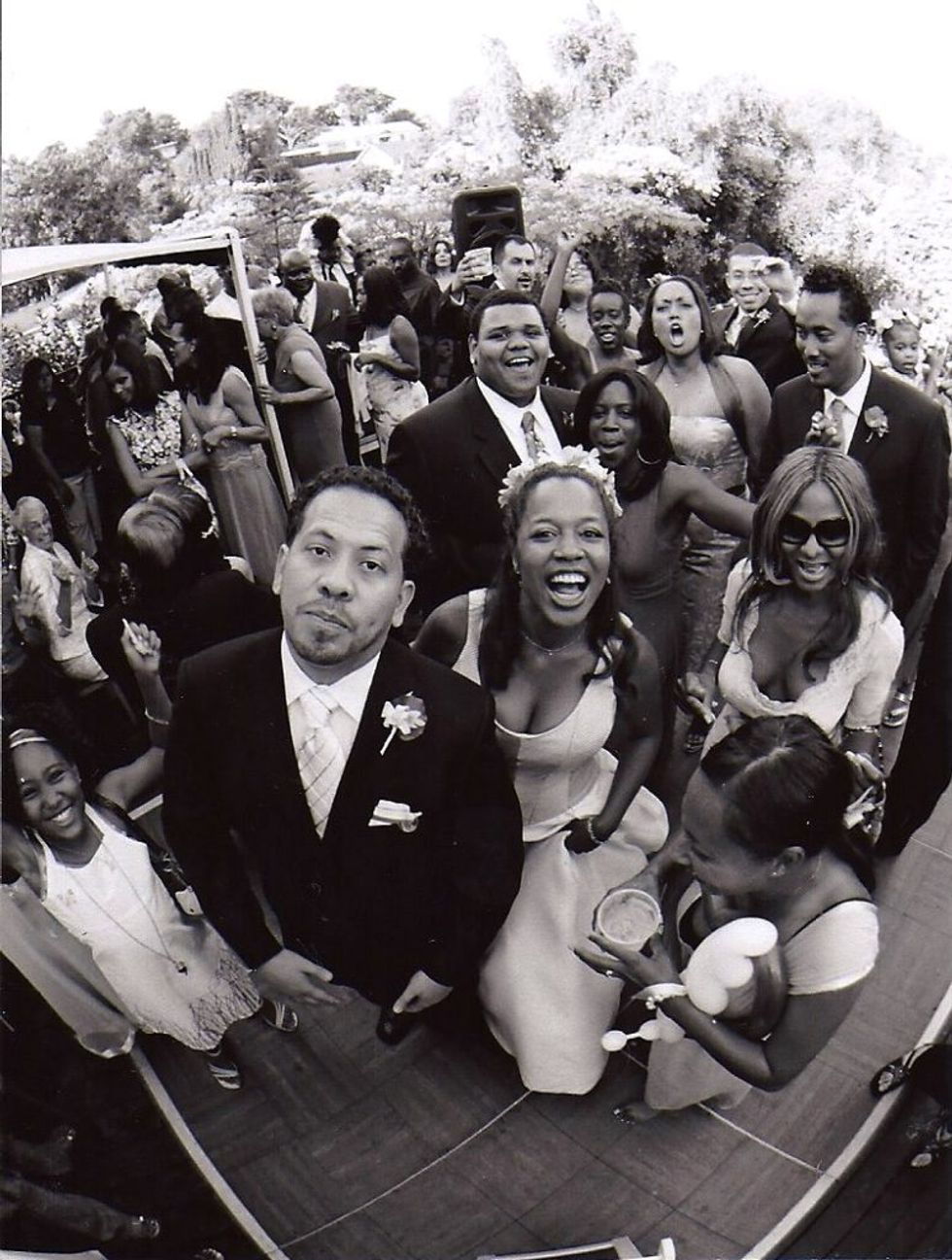
I admittedly tune in because there's something so authentic and real about their love that I admire. It's not sugar-coated, as you often find when public figures broadcast their marriage. On any given episode you can often hear the two bickering over everything from Elliott coming in the house too late (he has a 2am curfew) to Danyel being chastised for interrupting Wilson's conversation, but it's minor in comparison to the warmth that emits from their casual convos sprinkled with Elliott's iconic laugh and Danyel's Oakland-girl brashness.
“Whatever the week has brought, we try to give the listeners that, and it's fun. I mean, marriage is hard," Smith says. “Everybody's marriage is complex regardless of how they're presenting it, but to me, it's one of the greatest relationships of life if you're lucky to have it and if it's something that you want. I always remind everybody that marriage isn't something that's everybody's dream, it just isn't. But I think what is everybody's dream is to be loved, and that's what marriage at least does for me, it kind of reminds me of that on a daily basis that there is somebody that's there outside of family."
She also admits that it's sometimes how they catch up with one another, since their separate careers sometimes keep them apart during the week. Before things got hectic, Elliott would play her new music and she would play him old songs. Now they keep tradition alive through the podcast where the sounds of Sza are heard alongside Mary J. Blige.
“Us doing that, it really does bring us a lot of joy because we're like, we used to do this all the time for each other, like all the time! So it's been nice."
I tell her that they remind me of Brown Sugar—the movie where Sanaa Lathan plays Sidney, a successful Editor-In-Chief of XXLand her best-friend-turned-lover Dre (played by Taye Diggs) is a well-known A&R for the fictional Millennium Records, who later quits his job to start his label signing real hip-hop talent instead of the mainstream mockery that many labels have adhered to, sacrificing quality for dollars.
They fell in like through hip-hop and fell in love when they realized that they have more in common than just a passion for the genre. In this case, it's the love of culture and constantly learning and evolving that seems to keep them tied together. When I share this with Smith she says to me, “I've heard this so many times!"
And then admits that she's never seen the movie, probably because she's weirded out at the fact that everyone attributes her and her husband's relationship to a fictional story that has absolutely nothing to do with their lives (Elliott is, in fact, a journalist, and not an A&R executive). She identifies more with Queen Latifah's character in the 90s hit show Living Single, who runs the fictional Flava magazine—boss by day and navigating the world of relationships by night.
I get it because I used to do the same. Until I saw Brown Sugar.
A couple of minutes later Elliott is peaking around the corner, letting her know it's time to go. They're headed to a CRWN event, a live interview series that he hosts with some of today's top music artists. Tonight's session is with Mac Miller. Just like when Elliott shows support by coming to her events, she's making sure to be in attendance for his.
“We were living apart for 10 months when I was in Stanford [as a John S. Knight Journalism Fellow] recently, and that was one of the hardest parts, you know, not being able to be there for each other in certain moments. So, I think we might be overcompensating now where if I have something he's like, alright I'm there what time is it?"
She apologizes as she rushes me off the phone. My thoughts immediately go back to Sanaa's character when she gives Dre the money to launch his own record label or when at the last minute she goes to check out a new artist he's interested in signing. Always supportive, always there for him.
As we say our goodbyes, I can't help but smile as I click off the recorder.
Yeah, they're definitely Brown Sugar.
Featured image by Johnny Nunez/Getty Images for Remy Martin
This Is How To Keep 'Holiday Season Stress' From Infecting Your Relationship
Hmph. Maybe it’s just me, but it seems like there is something really weird happening in the fall season air (because winter doesn’t officially begin until December 21) that cuddle season is in full swing while break-up season is as well. In fact, did you know that break-ups are so popular during the holiday season that December 11 is deemed Break-Up Day?
The reasons why relationships shift around this time vary; however, I did both roll my eyes and chuckle when I read that a very popular one is because it’s an easy way to get out of getting one’s significant other a Christmas present. SMDH.
Anyway, I personally think that the less shallow folks out here may contemplate calling things “quits” or they at least distance themselves a bit from their partner (and what I’m referring to is serious relationships) due to all of the stress and strain that oftentimes comes with the holidays whether it be financial, familial, due to their tight schedules or something else.
Listen, I would hate for you and your man to miss the fun and happiness of experiencing this time of year, all because you are so overwhelmed or irritated that you can’t really enjoy it. That’s why I have a few practical tips for how to avoid allowing the typical holiday season stress from INFECTING your relationship.
Manage Your Expectations
 Giphy
GiphyUnmanaged expectations. If there is a main reason why the holiday season tends to be so stress-filled for so many people, I’d bet good money that this is the cause. And when you’re in a long-term relationship, expectations can manifest themselves in all sorts of cryptic and/or unexpected ways. You might have relatives who assume that you are going to be with them for Thanksgiving or Christmas when you have other plans in mind. You might be thinking that you are going to spend one amount for presents while your man is thinking something totally different. When it comes to scheduling, your signals may be crossed.
And you know what? To all of these scenarios, this is where clear and consistent communication come in. Don’t assume anything. Don’t dictate anything either. From now until New Year’s, mutually decide to check in once a week, just to make sure that you are both on the same page as it relates to the holidays and what you both are thinking will come along with it. The less blindsided you both feel, the less stressed out you will be. Trust me on this.
Set (and Keep) a Budget
 Giphy
GiphyOkay, so I read that last year, 36 percent of Americans incurred some type of holiday-related debt. Hmph. Last year, there was still some sense of normalcy in this country, chile, so I can only imagine what finances are gonna look like over the next several weeks. That said, since I don’t know a lot of people who don’t find being broke stressful, make sure that you and your bae set a budget and then stick to it this year — no ifs, ands or buts.
Because really, y’all — it doesn’t make sense to deplete savings and/or max out credit cards for a few days of giggles only to be damn near losing your mind because you don’t know how to make ends meet come Dr. Martin Luther King, Jr. Day.
And by the way, this tip doesn’t just speak to things like food and gifts; I also mean travel. If it doesn’t make a ton of sense (or cents) to be all over the place this year — DON’T BE.
Keep Matthew 5:37 at the Forefront
 Giphy
GiphyIf off the top of your head, you don’t know what Matthew 5:37 says, no worries, here ya go: “But let your ‘Yes’ be ‘Yes,’ and your ‘No,’ ‘No.’ For whatever is more than these is from the evil one.” That verse right there? Oh, it’s a boundaries lifesaver! I say that because do you see “maybe” or “I’ll think about it” in there? Nope. LOL. It says that you should tell people “yes” or “no” and leave it at that — and that complements Anne Lamott’s quote, “’No’ is a complete sentence” impeccably well. Yeah, you’ve got to remember that anything beyond a yes or no to a request is privileged information; you don’t owe anyone details or an explanation.
Besides, if you are really honest with yourself, when someone asks you something and you give a “Umm, let me think about it” kind of reply, more times than not, you already know what your answer is going to be — so why not let you both off of the hook? Give your response. Commit to that. And let everyone (including yourself) get on with their lives and schedules.
I promise you that when it comes to those holiday parties, you are pissing more folks off by not RSVP’ing or doing so and not showing up than just saying, “Thank you but not this year” off the rip.
Remember That Your Personal Space Is Privilege Not a Right
 Giphy
GiphyA friend of mine recently bought a new house and invited me over to come see it. He’s a single man with no children, so as I was taking in all of the space that he had, especially as I walked through his finished basement, I joked about relatives coming to live with him. “Hell no” and “absolutely not” were pretty much his immediate responses as he went on to say that some folks even had the nerve to be offended when he told them that he had no intentions on taking DNA in.
Ain’t it wild how people think that your stuff is their right? And yes, that brings me to my next point. Your home is your sanctuary space. If you want to host folks this year — cool. If not, ALSO COOL. Please don’t let folks (family included) guilt you into how they want you to act or even into what they would do if the shoe was on the other foot. You are not them — and as one of my favorite quotes states, “If two people were exactly alike, one of them would be unnecessary.” (A man by the name Larry Dixon said that.)
Hell, my friends? They know that I am good for sending them random things that they need or even want all throughout the year. Coming over to hang out at my pace, though. Uh-uh. Chalk it up to being a card-carrying member of the ambivert club yet I like keeping my living space personal — and I sleep like a baby, each and every night, for feeling that way.
Always remember that your space, your time, your resources, your energy and shoot, yourself period (including your relationship), are all things that are your own. You get to choose how, when and why you want to share them. The holiday season is certainly no exception.
Cultivate Some “You Two Only” Traditions
 Giphy
GiphyIt’s not uncommon for some couples to hit me up after the holiday season to “detox.” Sometimes it’s due to the financial drama (and sometimes trauma) that they experienced. Sometimes it’s because they allowed their relatives (especially in-laws) to get more into their personal business than they should’ve. More than anything, though, it tends to be because they didn’t get enough quality time together and so ended up feeling “disconnected.”
Please don’t let that happen. Listen, I’m not even a holidays kind of woman and yet, I will absolutely sit myself down with some hot chocolate and chocolate chip cookies to enjoy a Hallmark holiday film or two. Aside from the fact that most of them are lighthearted and sweet, I also like that they usually focus on couples loving on each other amidst all of the holiday beauty and ambiance — which is something that all couples should set aside some time to do.
Maybe it’s a vacation. Maybe it’s a staycation. Or maybe it’s my personal favorite, A SEXCATION. Whether it’s for a few days, the weekend or even overnight — don’t you let the holidays go by without setting aside time for you and your man to celebrate one another. Don’t you dare (check out “Are You Ready To Have Some Very Merry 'Christmas Sex'?”).
GET. SOME. REST.
 Giphy
GiphyI once read that 8 out of 10 people get stressed out over the holidays and 3 out of 10 lose sleep during to it — and when you’re stress-filled and sleep-deprived, that can absolutely lead to hypersensitivity, making mountains out of molehills and even not being in the mood for sex.
Your relationship can’t afford to go through any of this, so definitely make sure to prioritize rest. I don’t care how unrealistic it might seem during this time, sleep should never be seen as a luxury; it will always and forever be a great necessity.
That said, try to get no less than six hours of shut-eye in (check out “6 Fascinating Ways Sex And Sleep Definitely Go Hand In Hand”) and even ask your bae to take a nap with you sometimes (check out “Wanna Have Some Next-Level Sex? Take A Nap, Sis.”). Not only will sleep help to restore your mind, body and spirit but, when it’s with your partner, it’s an act of intimacy that can make you both feel super connected, even in the midst of what might feel like chaos.
___
Holiday season stress is real. Still, never give it the permission or power to throw your relationship off. Put you and your man first and let the holidays be what they are gonna be, chile.
Let’s make things inbox official! Sign up for the xoNecole newsletter for love, wellness, career, and exclusive content delivered straight to your inbox.
Featured image by Shutterstock
I wish I enjoyed drinking plain ole’ water. I don’t, though, and, at this point, I doubt that I ever will. It’s not something that I’m proud of or anything, but like I’ve said in other articles on this platform, to me, water is so damn boring; it’s literally like drinking “wet air.”
That doesn’t mean I don’t accept that it’s a “necessary evil” being that we all are made up of so much water and being dehydrated (which is something that a lot of us are) can cause so many health-related issues, including blurred vision, muscle cramps, dried skin, fatigue and even moodiness.
That’s why, over the years, I’ve been intentional about figuring out ways to get more agua into my body without feeling like it’s a chore or something to dread. And now, I want to pass some of those hacks on to you, just in case you happen to totally relate to where I am coming from.
If something that you want to do more of right through here is get extra H2O into your system, here are 10 tips that can absolutely help to make that possible.
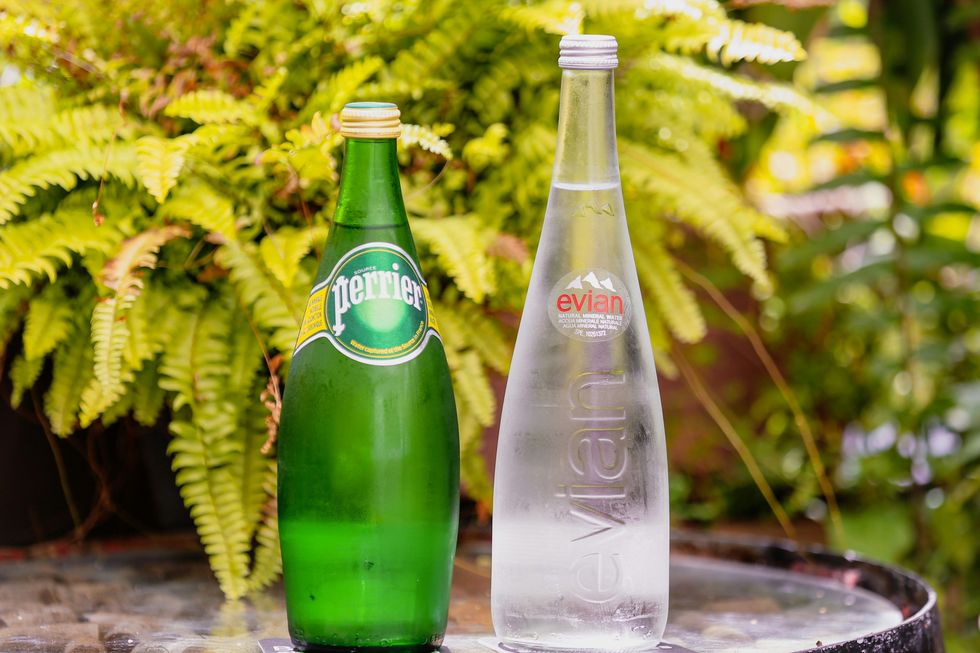
Unsplash
1. Invest in a Fun Water Bottle
There’s a far greater chance that you are going to drink water if you have a water bottle around you. So, cop yourself a cute one — one that will help you to stay motivated. A tumbler that I purchased some time back, just because I thought it was cute as hell, simply says, “Make Better Coochie Decisions” (amen?-LOL). Honestly, that doesn’t just have to apply to sex but how you treat your vagina overall — and that includes making sure that “she” has all of the fluids that she needs.
2. Try Some Sparkling Water or Mineral Water
At this point, I should take stock in Waterloo. It currently is my favorite kind of sparkling water and it has definitely made getting more water into my system easier to do. That’s because I will add some limes to it or a bit of fruit juice to it and that makes drinking water less “meh” for me. Another type of water that has bubbles in it is sparkling mineral water; it can also be beneficial since it contains magnesium, potassium and calcium.

Unsplash
3. Go Halfsies with Your Other Drinks of Choice
Speaking of making some all-natural soda (which is basically what happens when you add juice to sparkling water or sparkling mineral water), you can find yourself drinking more water while consuming less calories if you fill up your glass with half of your favorite fruit juice and half of some sparkling water. More times than not, the juice doesn’t even taste watered down. Try it before you doubt me.
4. Collect Some Infused Water Recipes
I’m forever gonna be a fan of infused water; that’s because it’s water that has fresh fruits and/or veggies in them — and it doesn’t get any healthier than that. Plus, infused water tends to take on the taste of whatever fruits or vegetables that you put into the water (if you let the stuff soak for a couple of hours), so that the water doesn’t taste so boring and bland. Wanna try a few recipes? You can check out some here and here.
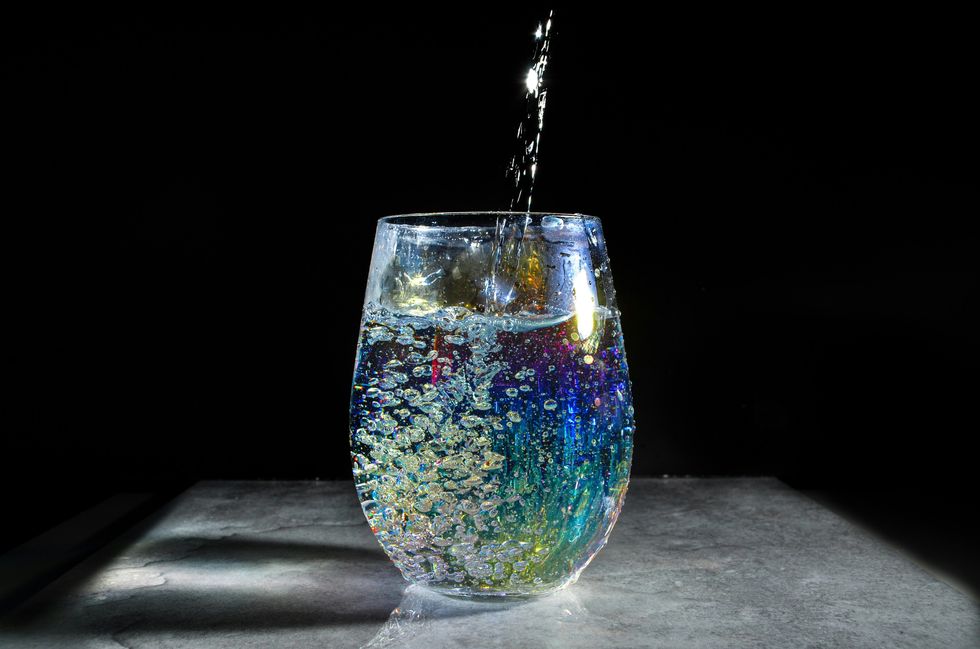
Unsplash
5. Make Slushies Instead of Smoothies
Are you someone who enjoys consuming smoothies? Well, if you want to get more water into your system, how about going with a slushie instead? Although it is true that some smoothies have water as a base, the most bomb ones use milk (or a milk alternative) or yogurt. Slushies, on the other hand, typically go with crushed ice (which is frozen water) instead. That said, some (pardon the pun) cool slushy recipes can be found here, here and here.
6. Use Water As Your “Drink Chaser”
Another great thing about water is it can help to keep you from overeating; it does that by causing you to feel full if you drink it while you are eating. And speaking of calorie-counting, if you don’t want to give up your favorite drink at mealtime, one way to keep from downing 2-3 glasses of it at a time is to use water as your “chaser.” What I mean by that is, after enjoying a glass of your favorite beverage, “chase it down” with a glass of water. That should satisfy your want for what you want without overdoing it.

Unsplash
7. Eat Foods That Are High in Water Content
Another way to get more water into your body is to eat foods that have a ton of water in them. Some that top the list include lettuce (96 percent); cucumber (95 percent); zucchini (95 percent); celery (95 percent); strawberries (91 percent); cantaloupe (90 percent), and peaches (89 percent).
8. Have a Ball with Your Ice Cubes
Ice cubes are frozen water, right? That’s why most of us prefer to enjoy our drinks before the ice cubes melt because melted cubes water down whatever it is that we are consuming. And so, for this very reason, add more ice cubes to your drinks — and have fun making them. You can add juice, fruit and/or mint leaves while making your cubes. That way, they are aesthetically-pleasing; plus, they will also add more flavor to your water once the ice cubes actually melt.

Unsplash
9. Add Some Non-Alcohol Cordial to Your Water
If you’re fine with just having a tad of taste in your water, why not add a bit of cordial to it? Cordial is simply a type of tonic, syrup or sweetener (that can contain alcohol or not) that can help to make your water more…interesting. Some alcohol-based cordials can be found here. Some non-alcoholic recipes are located here.
10. Technically, Herbal Tea Counts
Tea is always gonna be my thing. That’s why I’ve penned articles on it for the site like “10 Different Ways Herbal Teas Can Fit Into Your Beauty Regimen”, “10 'Uncommon' Teas You Should Add To Your Stash (& Why)” and “I've Got 10 Teas That Will Help You To Age (Even More) Gracefully” And y’all, if you want to get a lot more water into your system yet a tall glass of water only isn’t your — pardon the pun — cup of tea, make some iced herbal tea instead.
It’s basically water with some herbs tossed in and, if you add some honey or raw organic coconut palm sugar to it, it will be a really sweet treat that will still be extremely hydrating (and very healthy) for you.
Water that is a bit more exciting for you…now. LOL.
Drink up!
Let’s make things inbox official! Sign up for the xoNecole newsletter for love, wellness, career, and exclusive content delivered straight to your inbox.
Featured image by Unsplash









